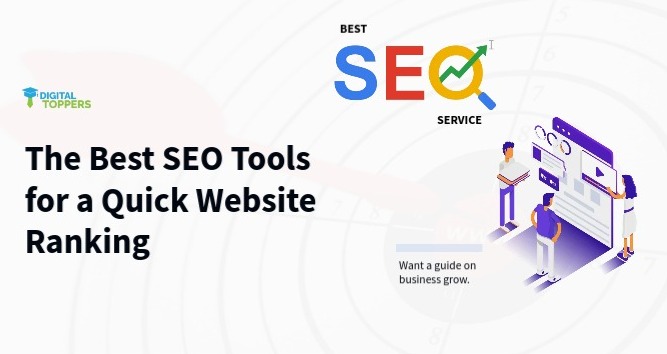The Best SEO Tools for a Quick Website Ranking

With the rapid growth of digital technology, SEO has become a most essential for successful businesses to increase their online visibility and to attract more customers. While choosing SEO tools, it’s essential to find options that provide excellent value for your budget. Here are some affordable, user-friendly, and effective SEO tools designed for small businesses too.
Google Analytics :
Google Analytics is a free web analytics service that offers valuable insights into website traffic. It’s particularly useful for business people, and helps them to understand where visitors come from, how they interact with the site, and identify any potential issues.
Key Features :
- Traffic Analysis
- User Behavior
- Conversion Tracking
- Audience Segmentation
- Ecommerce Tracking
Google Search Console :
Google Search Console is a free tool which is provided by Google and this allows website owners to monitor their site’s performance in Google Search results. It’s essential for understanding how your site is indexed, how users find it, and how it performs in search rankings. It also gives information regarding search variables, back link, and other problems that include technical difficulties that affect your site.
Key Features :
- Search Performance Analytics
- Index Coverage Reports
- Mobile Usability Tracking
- Sitemap Submission
SEMrush :
SEMrush is an online marketing suite that offers a wide range of tools for SEO, PPC advertising, content marketing, and competitive analysis.It also provides services for keyword research, competitors, audit sites, and others. Although it has the paid version of its services, it offers a large amount of data that might be valuable for growing businesses.
Key Features:
- Keyword research and tracking
- Competitor analysis
- Site audits
- Backlink analysis
Ahrefs :
Ahrefs is a leading SEO tool that specializes in backlink analysis and super effective in keywords exploration functionalities.It offers a comprehensive suite of tools for understanding your website’s backlink profile, analyzing your competitors’ backlinks, and identifying opportunities for link building.It will be useful for companies to assess their link-building situation and use SEO-friendly strategies to improve their standings.
Key Features :
- Backlink Checker
- Site Explorer
- Keywords research
- Competitor Analysis
- Content Explorer
Moz Pro :
Moz Pro is a popular SEO suite that offers a wide range of tools for optimizing your website’s search engine rankings. It also provides insights into your website’s SEO health, keyword research, competitor analysis, and link building.
Key Features :
- Keyword explorer
- Site audit reports and crawl reports
- Rank tracking
- Competitor Analysis
- On-page optimization suggestions
Yoast SEO (For WordPress):
Yoast SEO is one of the leading WordPress plugins that assist the process of optimizing your website for search engines. It provides a user-friendly interface especially with the features designed to help you to improve your website’s SEO. And also It will be easy to use especially when it comes to on-page optimization and offers prompt notification for the same.
Key Features :
- Real-time SEO Analysis
- Readability Checks
- XML Sitemap Creation
- Social Media Integration
- Internal Linking Suggestions
- Breadcrumbs
Ubersuggest :
Ubersuggest is an SEO tool that costs less and provides information on keyword research, competitor analysis, and backlink checking. It’s a user-friendly tool that’s suitable for both beginners and experienced SEO professionals.
Key Features :
- Keyword suggestions and tracking
- Content ideas and analysis
- Backlink data
- SEO audit reports
Screaming Frog SEO Spider :
Screaming Frog SEO Spider is a powerful SEO auditing tool that crawls into your website to identify your issues that could affect your search engine rankings.There is an open-source version and a commercial one. The open-source version will be perfect for business needs.
Key Features :
- Site Crawling
- On-Page SEO Analysis
- Site Structure Analysis
- XML Sitemap Generation
- Customizable Reports
- Integration with Google Analytics
Serpstat :
Serpstat One of the best seo tools for Keywords Research, Backlinks Analysis and Site Audit. This helps you to improve your website’s visibility and attract more organic traffic.
Key Features :
- Keyword Research
- Rank Tracking
- Backlink Analysis
- On-Page SEO Analysis
- Competitor Analysis
- Content Marketing Tools
Answer The Public :
Answer the public is a unique keyword research tool that helps you discover the questions people are asking in Google search. Answer the public is a valuable tool for content marketers, copywriters, and anyone looking to create content.
Key Features :
- Question Generation
- Visualization
- Search Intent Analysis
- Content Idea Generation
Conclusion :
The right SEO tools can make a significant difference in boosting your business’s online presence. Whether you’re a small business owner or part of a larger enterprise, tools like Google Analytics, Google Search Console, and Ubersuggest provide excellent options for tracking traffic, improving search rankings, and optimizing your content. More advanced tools like SEMrush, Ahrefs, and MozPro offer comprehensive insights for keyword research, backlink analysis, and competitor tracking, while WordPress users can benefit from Yoast SEO’s ease of use. By using these tools effectively, you can develop a strong SEO strategy that enhances your visibility, attracts more organic traffic, and drives business growth.
Also read: How to Create Facebook Ads – A Guide for Trichy Business People
To learn more about SEO : Click Here
The Best SEO Tools for a Quick Website Ranking Read More »










